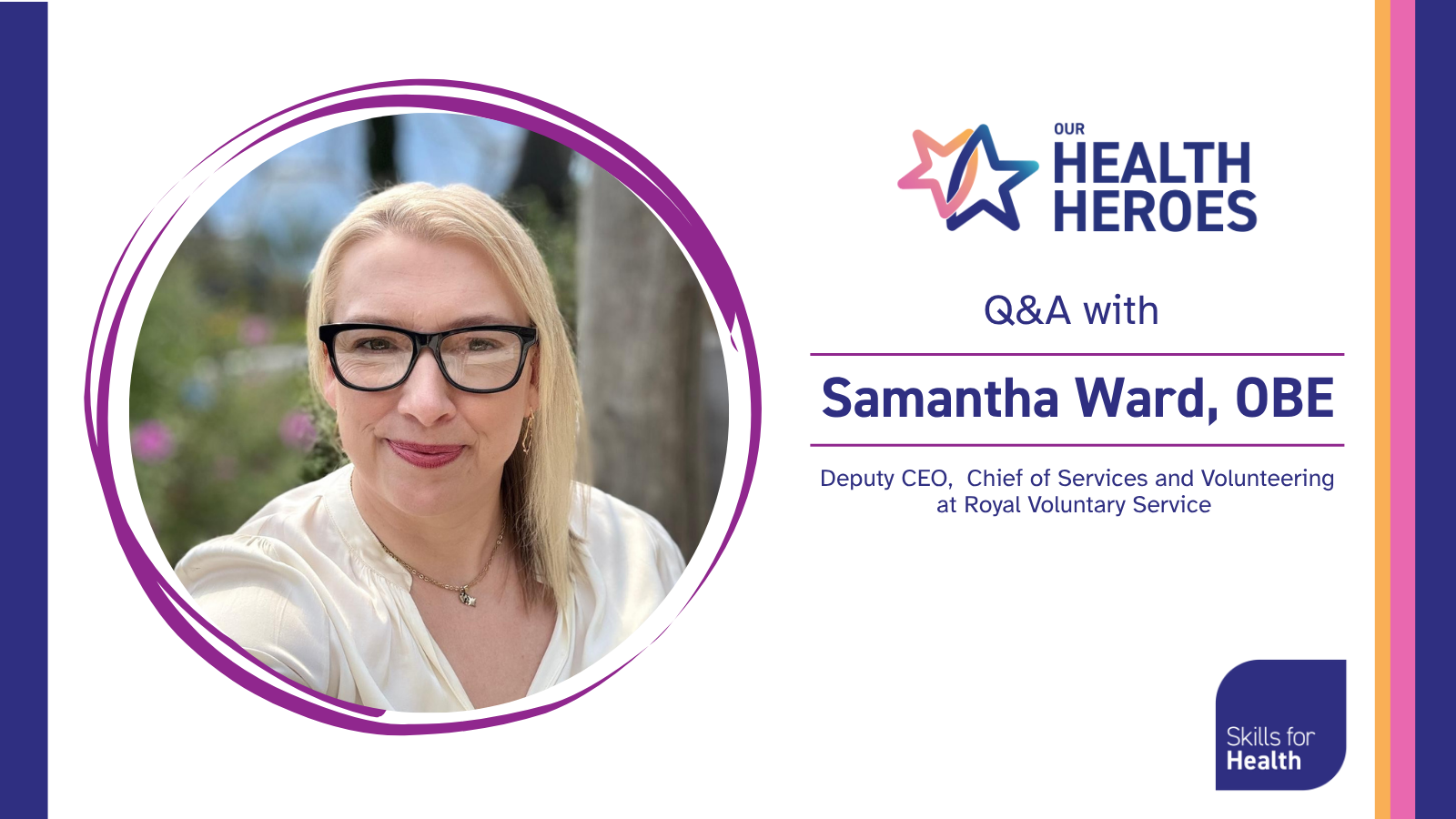
| 14 May 2025
Ahead of Skills for Health’s Our Health Heroes Awards on 22 May, we spoke to Samantha Ward OBE, Deputy CEO of the Royal Voluntary Service. Samantha explains why it’s important that Our Health Heroes recognises the role of volunteers in our NHS.
Sam, as Deputy CEO, what does your role entail?
Royal Voluntary Service is one of the country’s largest volunteering organisations, and in my role at the charity I have both strategic and operational responsibilities. As well as a strategic oversight, I’m responsible for the delivery of the charity’s complete portfolio of services, powered by our incredible volunteers and colleagues. This includes our vital health and community programmes, from home libraries and dementia support groups to patient transport, home from hospital assistance, companionship, and more. It also includes our Services Welfare activities – a legacy initiative that provides essential support to service personnel in the UK’s Armed Forces. As a qualified Leadership Coach, I’m especially passionate about helping colleagues grow in their roles and achieve their personal development goals.
You’ve been with Royal Voluntary Service since the year 2000. How has volunteering evolved over the years, and what role do volunteers play in supporting healthcare services?
Volunteering has continually evolved since I joined Royal Voluntary Service but remains as crucial as ever in supporting healthcare services and communities across Britain. I’ve met so many amazing volunteers who give their time to support others and witnessed the truly inspiring unity that emerged during the Covid-19 pandemic. At such an unprecedented time, people across the country came together to provide vital support to one another, to vulnerable people and to our healthcare services and colleagues.
In recent years, digital advances have greatly influenced and supported a shift towards a balance between regular, long-term volunteering and more micro, task-driven opportunities. Looking towards the future, I see volunteering evolving even further, as Royal Voluntary Service is developing a digital volunteering platform set to revolutionise volunteering, making it easier for people to click and connect with causes of all sizes they care about, including to support health and social care.
What are some of the biggest challenges you have faced in your role, and how have you overcome them?
Navigating the ever-changing external environment is a constant challenge – none more so than during the Covid-19 crisis. I led a full pivot of our service offering during the pandemic, developing and operationalising the NHS and Care Volunteer Responders programme. This rapid response enabled us to launch a fresh volunteering and vaccination support programme at pace, all while continuing to deliver compassionate Royal Voluntary Service support through virtual and socially distanced interventions.
As we began the post-pandemic recovery, we built a new hospital retail offering from a flat-line base to reach new audiences. The cultural change brought about by such uncertainty meant we leaned heavily into our organisational values and mission to maintain a strong, consistent purpose – the golden thread that guided us through. It required a full organisational effort, no silos allowed!
Can you share a memorable experience or story that highlights the impact of volunteers in healthcare?
Volunteers have a real, tangible impact in healthcare. Through the NHS and Care Volunteer Responders programme annual client survey, we found that 42% of Telephone Support clients say they visit their GP less often as a result of the support – proof that regular, compassionate social contact helps people feel more supported and in control. Those supported by the programme also report higher levels of satisfaction with the healthcare system than national figures from ONS data.
In 2016, our evaluation revealed that our Home from Hospital service which supports people after a hospital admission, delivered with nine hospitals in Leicestershire, achieved a 30-day readmission rate of just 9.2% – which was well below the national average at the time of 15% for over-75s. It’s clear: volunteering doesn’t just complement care – it strengthens it.
From personal experience, I saw what a significant difference the support from our Dementia Support Groups make. My aunt regularly attended one such group and both the joy it brought her, and the comfort it brought to the family by taking daily pressure from her daughter as a carer, were invaluable.
If you could give one piece of advice to someone considering volunteering, what would it be?
To anyone considering volunteering I’d say just take the first step — no matter how small it is. Volunteering doesn’t have to mean a huge time commitment or a formal role, even an hour of your time can have a real impact on causes and communities. So often, people hesitate because they’re unsure what to expect, but what they find is a sense of connection, purpose, and community that’s incredibly rewarding. You don’t have to have all the answers — just a willingness to help is enough to start. For over 30 years, I have volunteered in many roles and causes and I leave a shift feeling good, often having had a meaningful or joyful experience – just have a go!
Finally, what is your message for our finalists?
To each of the finalists — thank you, and congratulations. Your dedication, compassion, and commitment to making a difference are truly inspiring. You represent the very best of what volunteering and active citizenship can achieve. Whether you realise it or not, your actions ripple far beyond the people you directly support, they uplift entire communities. We’re incredibly proud to celebrate you, and I hope you take this moment to reflect on the incredible impact you’ve made.
Supported by NHS England, NHS Employers, NHS Shared Business Services, NHS Race & Health Observatory, SFJ Awards, Integrated Care Journal and iCQ Awards, Skills for Health’s Our Health Heroes recognises and honours the hard work carried out daily by thousands of staff across the UK.
Find out more